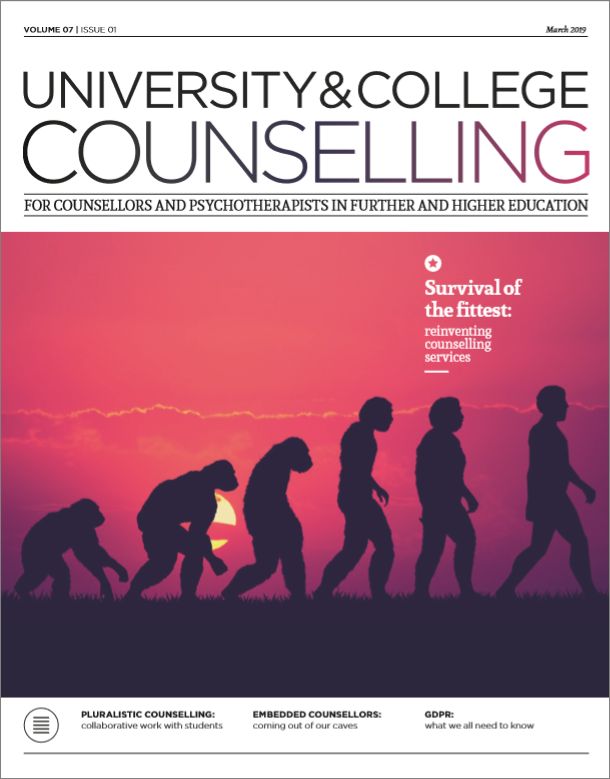In this issue
Features
A pluralistic approach to student counselling (free article)
Marcia Stoll and John McLeod outline a collaborative way of working with students which puts change firmly on the agenda
Innovative models of care for students: the embedded approach
Locating counsellors within academic departments can yield great outcomes. David Adams writes about the outcome of a project at Illinois State University
Brexit in the staff counselling room
Bridget Hazell reflects on the very personal impact of a national debate as it surfaces in the therapy room
The men’s group dilemma
What is a man? Are men as emotional as women? Do men seek emotional intimacy with other men? Phillip Grote reflects on a powerful experience of leading a men’s support group
Demystifying the general data protection regulation (GDPR): some of the issues relevant to the counselling professions
David Membrey and Barbara Mitchels summarise key aspects of GDPR as it impinges on our work
Regulars
Profile
Géraldine Dufour and Alan Percy
Divisional news
Notes from FE
Mary Jones
Notes from the Chair
Géraldine Dufour
Notes from HUCS
Alan Percy

Divisional members and subscribers can download the pdf from the University and College Counselling archive
From the editor
‘It’s a jungle out there!’ With rising demand from students, academic staff, parents, senior managers and others, the pressures on services, managers and practitioners are, perhaps, greater than at any time. In this issue, we see clear evidence that services are making huge efforts to evolve and diversify in order to survive in this demanding environment and to deliver flexible, professional services to both staff and students.
One of the biggest changes may be a greater willingness to talk about our work. There is growing recognition that we are not apart from our employing institutions but can become a strategic element within them when good inter-service relationships are developed. In this issue we have an excellent example of this kind of collaborative working: David Adams from Illinois State University shows how counsellors working within academic departments have brought rich rewards for all concerned. This ‘out of the box’ thinking demonstrates that counsellors, far from being the precious, remote, ‘difficult’ people we are sometimes portrayed as, can add real value to the student experience and an institution’s reputation.
And it’s not only in terms of where we carry out our work, but what we deliver and how. Again, there are exciting developments. Phillip Grote describes his experience of running a men’s support group, and Marcia Stoll and John McLeod present an overview of pluralistic therapy, ideally suited, they believe, to our work with a student population.
Underpinning our work, of course, must be solid professional practice and awareness of legislation affecting it. The introduction of the EU General Data Protection Regulation (GDPR) has affected us all, and we all have a duty to understand how it impacts on our work. David Membrey and Barbara Mitchels explain the important implications of GDPR with a piece that I’m sure will be useful to keep to hand. And mentioning the EU will – undoubtedly – remind us all of the ‘B’ word: another huge shift in our social, cultural and working environments. Bridget Hazell writes about the impact of Brexit on academic staff: a sobering read.
So – there we have it. We live in ‘interesting times’: times that require all of us to demonstrate flexibility and professionalism – and to provide evidence that what we are doing really does make the difference we claim. Not for the fainthearted, the work nevertheless continues to bring huge satisfaction, as evidenced by the deep commitment and integrity of our contributors.
David Mair
david.mair@bacp.co.u
